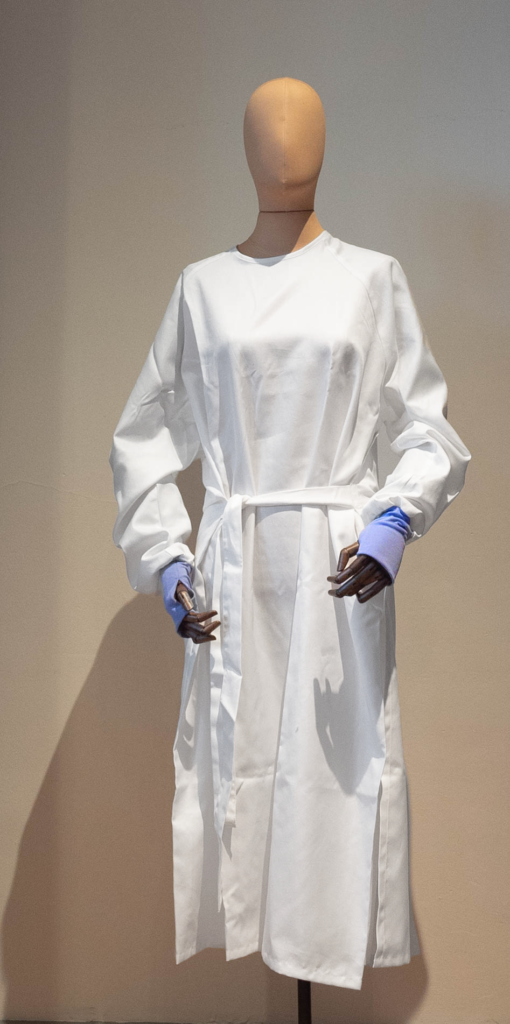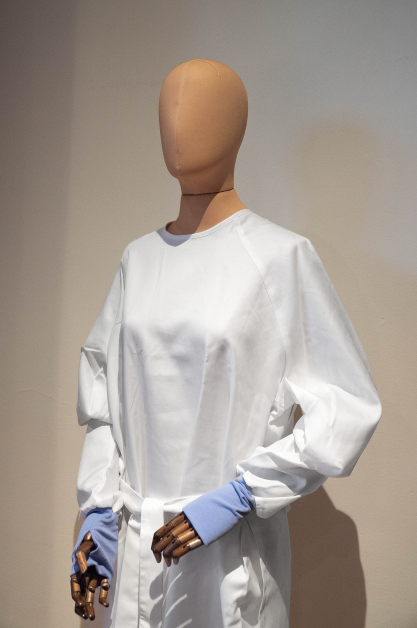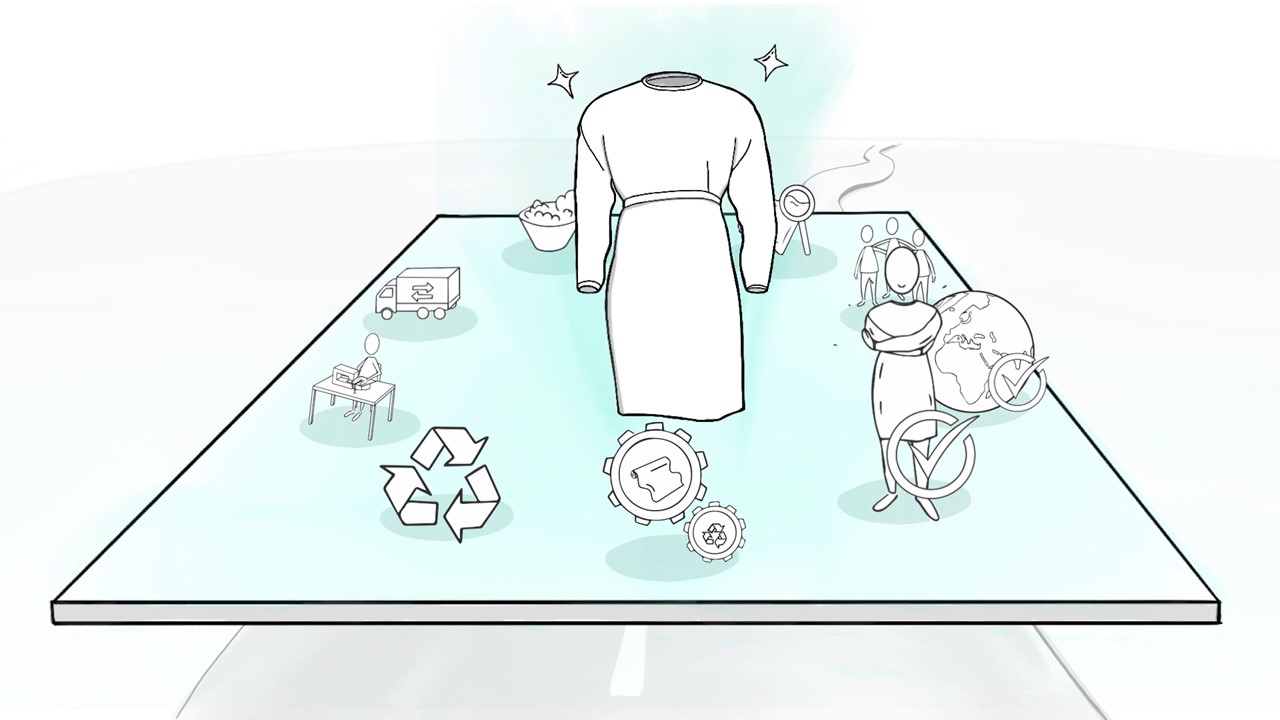The development of circular isolation gowns
A case study
We are all aware that the covid pandemic has a huge impact on the health care sector. One aspect, that is easily overlooked, is the impact this also has on textile use and thus on our environment. The reason is that it is common use, and in many cases mandatory, that if a patient is treated, the nurse wears an isolation gown to protect her/him from contamination with the virus and it is also common practice that this gown is discarded after every single use to avoid cross contamination. And there is the issue: in many instances these gowns are disposables. Literally millions of these disposable gowns are being used only once and disposed off after every single use. The fact that these gowns are made of cheap oil based manmade materials, polyolefins like polyethylene, supports this throw away practice. Usually, after use these gowns are incinerated.
The Amsterdam pilot of Reflow is aimed at developing a circular textile economy or: rethinking the lifecycle of textiles with citizens and stakeholders. In the Metropole Region of Amsterdam, MRA, more than 5 million isolation gowns are used and disposed off annually. That is why several parties in the MRA region have joined forces to rethink the current practice of these disposable isolation gowns and want to develop more sustainable alternatives. The Reflow team was part of this group. The basic idea was to develop a reusable isolation gown.

Obviously, it had to serve a business goal as well and that is why one of the key players in this project is what we call a textile service provider. This company has been specialized in washing and renting high-quality textiles for more than 100 years. They provide these services to hospitals, healthcare institutions, and holiday parks, both in the Netherlands and in Belgium. The business model is as follows: they buy/own the textile products like bedsheets, blankets, towels, and gowns. They charge their customers a price for clean and whole products, so the cost of in use price is charged. That means that every day used textiles are collected, transported to one of their facilities, cleaned, stored, and distributed again. Their contracts include a fixed price per wash/service action. It is expected that the reusable gowns will be part of this logistical system. It is unlikely that they will accept that others own the gowns.
Of course, we also need end users. Two health care institutes participate in this project as the end users. And following the current practise they will pay per use. The newly designed gown must be designed and produced, and that role is taken by a creative textile agency with a big social mission. In this stage of the project, they will produce the gowns and will be paid per item. It is a social enterprise, and they are funded by charity organisations like special funds provided by banks, the lottery, and the Dutch government (RVO) and they have several sponsors. The project is managed by a social enterprise with the mission of raising awareness about the environmental impact of the textile industry and inspiring the use of circular textiles. Since the newly developed gown will be washed repeatedly the water company for Amsterdam and surrounding area is also a member of the team. They are the only water company in the Netherlands that is dedicated to the entire cycle. They participate in the project since they want to reduce the shredding of microparticles. They act more as knowledge providers in the project. There is also a textile recycling company in the team is since they see an opportunity to make the gowns of circular cotton. Reflow contributes by bringing in textile knowledge and they provide expertise, like on water- or soil repellence.
So, there is a project team and we started to meet frequently. One of the first tasks was the development of a list of product specifications that should be met. In the first meeting it also became clear that cotton or polyester were the two materials that could possibly be used to make these new gowns. But to minimise the risk of microparticle shredding, cotton was selected to develop the first demonstrator of the isolation gown. But polyester was not banned and remained a possibility to be evaluated in a later stage.
A very important property of isolation gowns in health care is the repellence of water/ blood for obvious reasons. And of course, we did not want to use the potentially toxic and banned PFAS. Together with a supplier of chemicals we tested a biobased alternative that will now be used.
This newly designed cotton gown must meet requirements set by the end user, the nursing staff. As a start after designing, we made 25 prototypes of 100 % cotton, suitable for recycling and designed to offer comfort and easy of use. These gowns were tested at the facilities of the participating health care institutes which led to minor modifications. This testing included washing tests since the idea is that these gowns must be able to withstand at least 100 washings in an industrial laundry.
Obviously, these new gowns must score better in terms of environmental performance as well. The goal is that these new cotton-based gown can be washed a hundred times before they should be recycled. In addition, we talk about 50.000 cotton gowns that must replace the 5.000.000 oil-based gowns that are used in the Amsterdam Region per year. These 5.000.000 oil-based PE/PP gowns emit 1.412 ton of CO2/year. These are sourced from anywhere if the price is low enough (shiploads in containers from Asia). The cotton equivalent of 50.000 gowns, with 100 washing per gown emit 383 ton of CO2/year. For this part of the project this is sourced from France, near Lyon. Confection in Amsterdam. In conclusion the advantage of using recycled cotton is over 1000 ton of CO2 reduction/year.
So, the environmental benefits are clear, but what about the business case?
We are now preparing a sort of demonstrator phase that will employ 3000 isolation gowns based on the design tested and made of 100% cotton and made water repellent with the biobased alternative finish on it. Obviously, this small scale of 3000 gowns makes it necessary to find supportive funding. But on a scale of 50.000 gowns that is a different situation and that will be part of the Reflow legacy.

Amsterdam pilot partners
The key player in this project is Cleanlease. Cleanlease is what we call a textile service provider only in Dutch and French). They have been specializing in cleaning and renting high-quality textiles for more than 100 years. They provide services to hospitals, healthcare institutions and holiday parks, both in the Netherlands and in Belgium. The business model is as follows: Cleanlease buy/own the textile products like bedsheets, blankets, towels, and gowns. They charge their customers a price for clean and whole products, thus the cost in use price is charged. That means that on a daily basis used textiles are collected, transported to one of their facilities, cleaned, repaired, stored and distributed again. Their contracts include a fixed price per wash/service action. It is expected that the reusable gowns will be part of this logistical system. It is unlikely that they will accept that others own the gowns. In the next stage of the project, a Reflow legacy item, the municipality of Amsterdam has granted a subsidy to take care of the cost involved for producing 3000 isolation gowns made of cotton and suitable for recycling. Cleanlease will distribute and maintain these gowns in a regular business system. So, a real pilot project.
The health care institutes in this project OLVG and Cordaan are simply the users, and they will pay per use. Part of the granted subsidy will be used to cover the initial costs involved.
Makers Unite is a textile based creative agency with a big social mission. In this next stage of the project, they will produce the gowns and Cleanlease will buy the manufactured gowns and they will be paid per item. It is a social enterprise and are funded by charity organisations like special finds provide by the Rabobank, vriendenloterij, Dutch government (RVO) and they have several industry sponsors like ByBorre and Unilever.
Reblend is managing the project and is paid though subsidies. ReBlend is a social enterprise with the mission of raising awareness about the environmental impact of the textile industry and inspiring the use of circular textiles.
Waternet is the water company for Amsterdam and surrounding area. They are the only water company in the Netherlands that is dedicated to the entire cycle. They participate in the project since they want to reduce the potential shredding of microparticles and of course to improve the laundry process at Cleanlease. They are more knowledge providers in the project.
Purfi is interested in the project since they are a textile recycling company and see an opportunity the make the cotton gowns circular. The idea is that after the useful life of the gowns, Purfil will collect the discarded gowns and through their recycling process make recycle yarns that will subsequently be used to make new gowns. Purfi is therefore the potential recycling partner.
Reflow has actively supported the project through Reflow participant BMA Techne and its partner Alcon Advies. This team has provided textile materials and textile processing technology. They also provided expert knowledge on ecological analysis and finishing and hygiene aspects like e.g. water repellence.
